A timeline of Hook
Hook's Historical
Treasure Trove
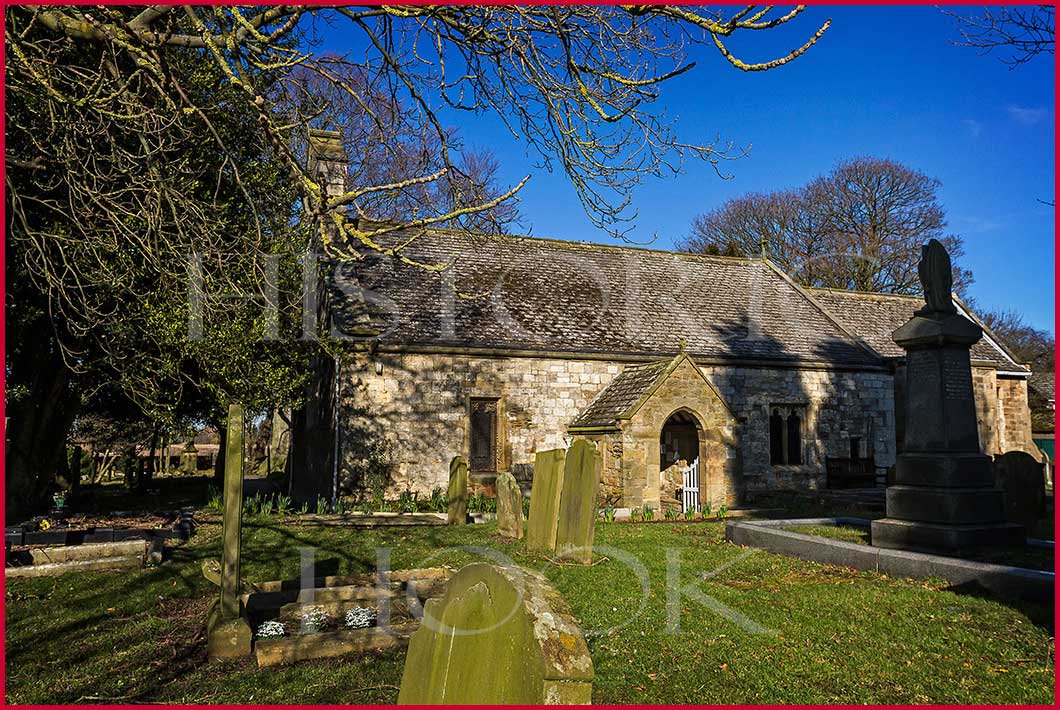
Built as a Chantry Chapel?
Hook was, for all its early history, in the parish of Snaith and under the control of Selby Abbey. In 1224 the Abbot of Selby, Richard de Kellesay (1224-1237), granted a licence to Baron John de Houke for a chantry chapel in the courtyard of his manor house. The building of 1225 (an early English building) forms the basis of St. Mary's church which stands in the village today.
What is a Chantry Chapel?
In the catholic church of medieval times there was a belief that the soul of those who died in a state of grace (i.e. faith and belief in Jesus and the Church's teaching) went to Purgatory. This was a place of temporary punishment or half-way house between earth and heaven. How long one spent there depended on how sinful someone had been in this life. Time spent in Purgatory could be reduced by pilgrimages, acts of charity and if Masses (prayers) were said for your soul. So rich families would have a chantry chapel built (either as part of a great church or monastery or as a private chapel) where a priest was employed to say daily Mass for the soul of the dead person. Often this chapel and priest provided other services for the family.
Hook Church
- At the heart of the village since 1225
It is believed that in early times there was a hermatige at Hook. It was a simple home for someone who dedictated his life to the service of God and lived alone (apart from occasional guests) under strict conditions set out by the rule of St. Benedict. So worship of God in this place may go back over a thousand years.
In early times the church is said to have been dedicated to John the Baptist, but by 1560 it was, as is now, dedicated to St. Mary, Jesus' mother. In 1499 the 'Chapel Yard' at Hook was consecrated to be a burial ground for the use of Hook, Airmyn and Goole even though St. Mary's continued to be in the parish of Snaith. By the 18th century Hook had become a separate parish, Admiral Sotheron having the right to appoint clergy.
In 1844 St. Mary's was extensively restored. This was reported in the Leeds Intelligencer of May 1844 as follows:
"The small church at Hook, near Goole, has undergone considerable repairs and restorations.... and this little edifice may be pronounced a model of what a parish church should be in a rural district".
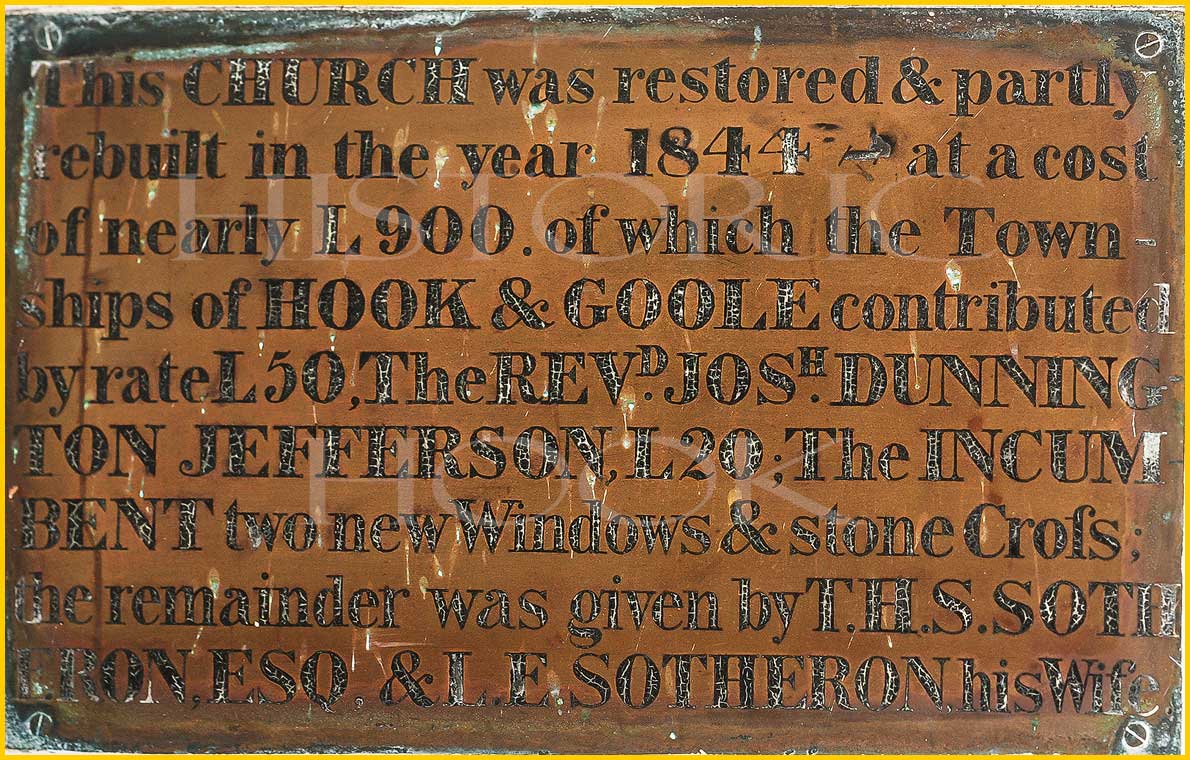
The artist's impression (right) shows what the church may have looked like in about 1400. In those days and for much of the following centuries the church was the only stone building in the village and one would imagine was an amazing and awe-inspiring place to most people who came into it from their small, smoky mud and wattle houses. Most likely the church had elaborate and amazing paintings on the walls and stained glass in all the windows depicting the bible stories and Christian beliefs of the time.
In many places such chapels had in a 'chancel' to the east of a 'rood screen' a beautiful, highly decorated and elaborate 'sanctuary' with many religious symbols and artefacts. This area was kept 'holy' and used only for worship and religious purposes - here it could especially have been the place where the chantry prayers were said daily.
The rest of such churches, the Nave, contained only a few pews or benches by the wall. This area was used for larger services of worship. During parts of these larger services, said in Latin, people often wandered around, sometimes using icons or other sculptures to help their worship. They often wandered around to look at them.
When medieval churches were not being used for worship it was common for them to be used for all sorts of secular purposes, from courts to markets and feasts.
We don't know if this happened here at Hook but imagine it may well have done particularly when the church became the village church rather than the de Houks private chapel.
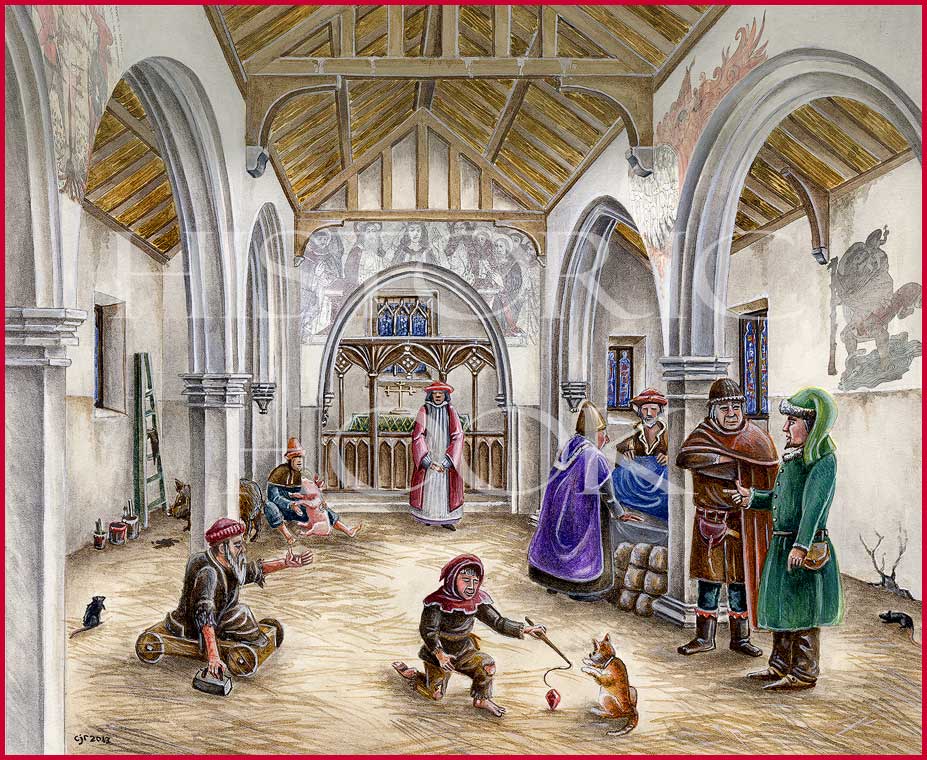
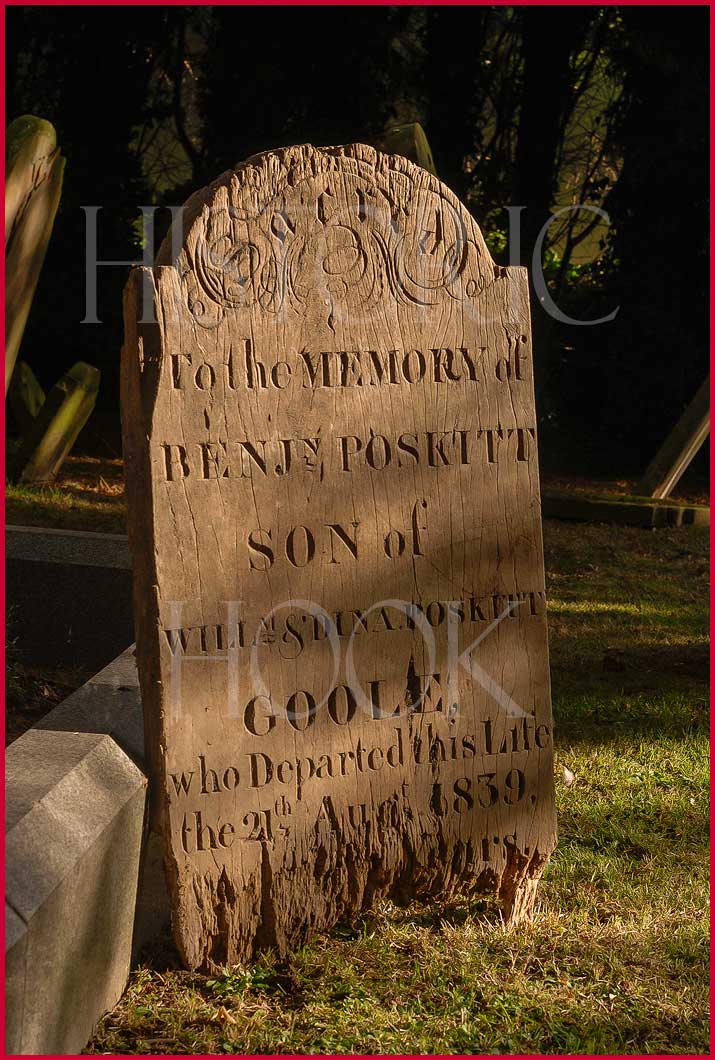
There are many interesting memorials inside and outside of the church but of particular note is this wooden memorial board (above) preserved from a burial in 1839. It is amazing to have this here, for there are very few remaining in the country even though 200 years ago they were quite common-place. Back then many people were remembered without memorial, some with a simple oak cross, richer people with a board such as this and only the richest with stone memorials. For most of history once a period of time had passed (50-100 years when the oak cross had rotted and gone, or the memorial board had fallen over and been removed), it was common to dig new graves where old graves had been.
The north wall was rebult and other walls repaired. New open seats, a new desk, pulpit and communion rail were installed, windows were moved and the medieval church changed to match the needs of Victorian worship. It looked much as it does today, but quite different from its medieval state.
(See artist's impression left of what the church may have looked like in around 1400)
Much of the cost of the restoration was paid by Thomas and Lucy Sotheron who in the same year paid to erect the village school.
During restoration work in 2007 wall paintings were discovered on the east wall and have been kept exposed to view. An angel on the left is particularly fine with much detail remaining on the face and wings. The stained glass in the east window was added in 1879. It is interesting that at its centre is John the Baptist an echo of the earlier dedication of the church.
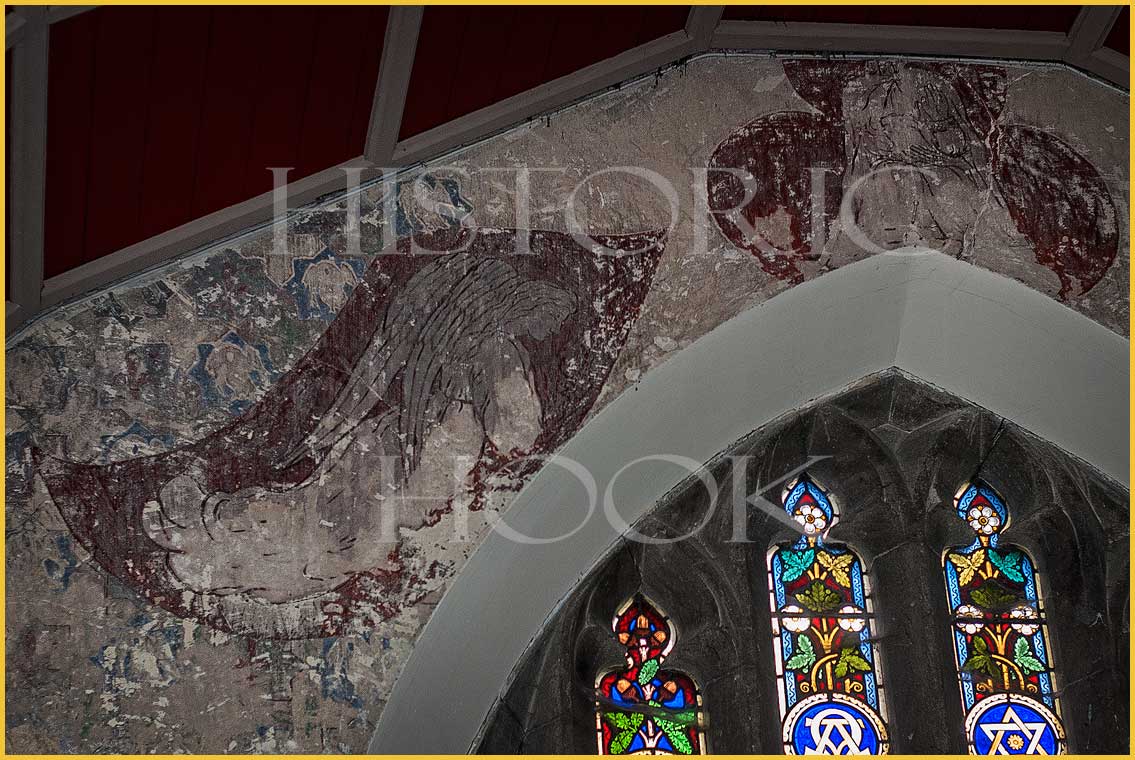

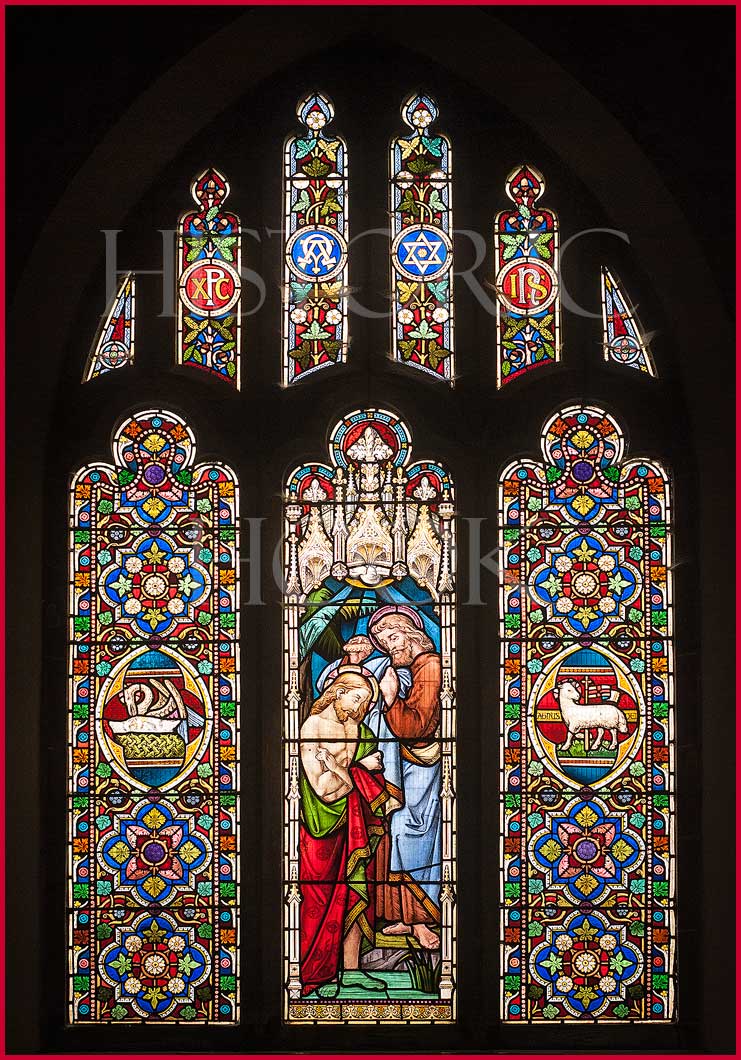
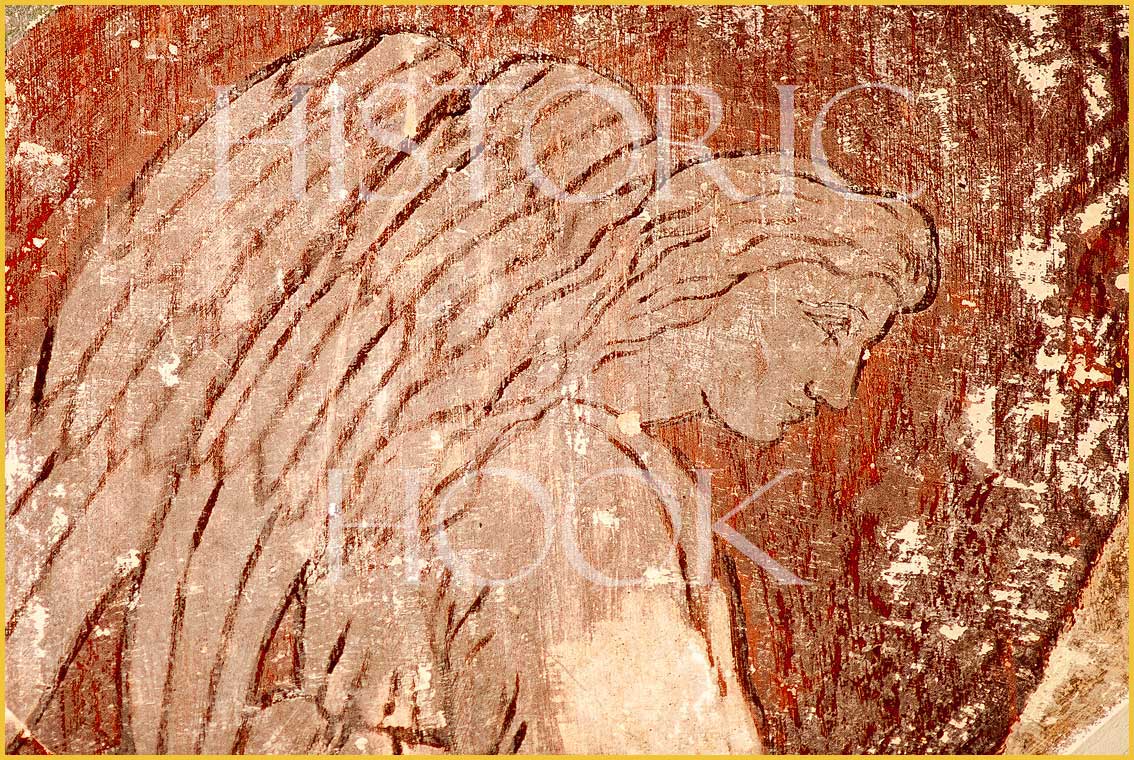
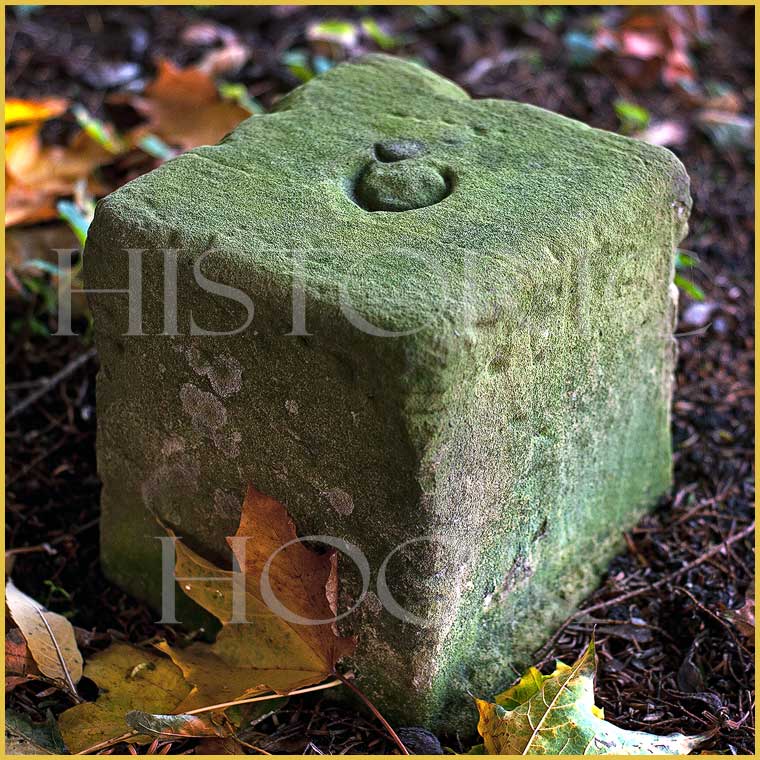
There is no sign of the oldest burials from 1499. The memorials in the churchyard are mostly from the 19th century onwards after stone became more affordable as a material for monuments. The simplest of the stone monuments are the mass grave markers for the 197 people who died from cholera in the epidemics of 1832 and 1848. You can recognise these as they are marked with a small square stone and carved on top is the letter 'C', to remind people not to re-bury there.
In subsequent years the rest of the windows of St. Mary's were filled with stained glass which like the medieval glass depicts the stories of the bible, apart from the most notable window in the south east of the chancel which depicts Queen Victoria wearing glasses and in a wheel-chair, one of only two windows in the country which show this. She is shown presenting flowers to the war wounded from the Anglo-Boer war, copied from an illustration from the work of Samuel Begg.
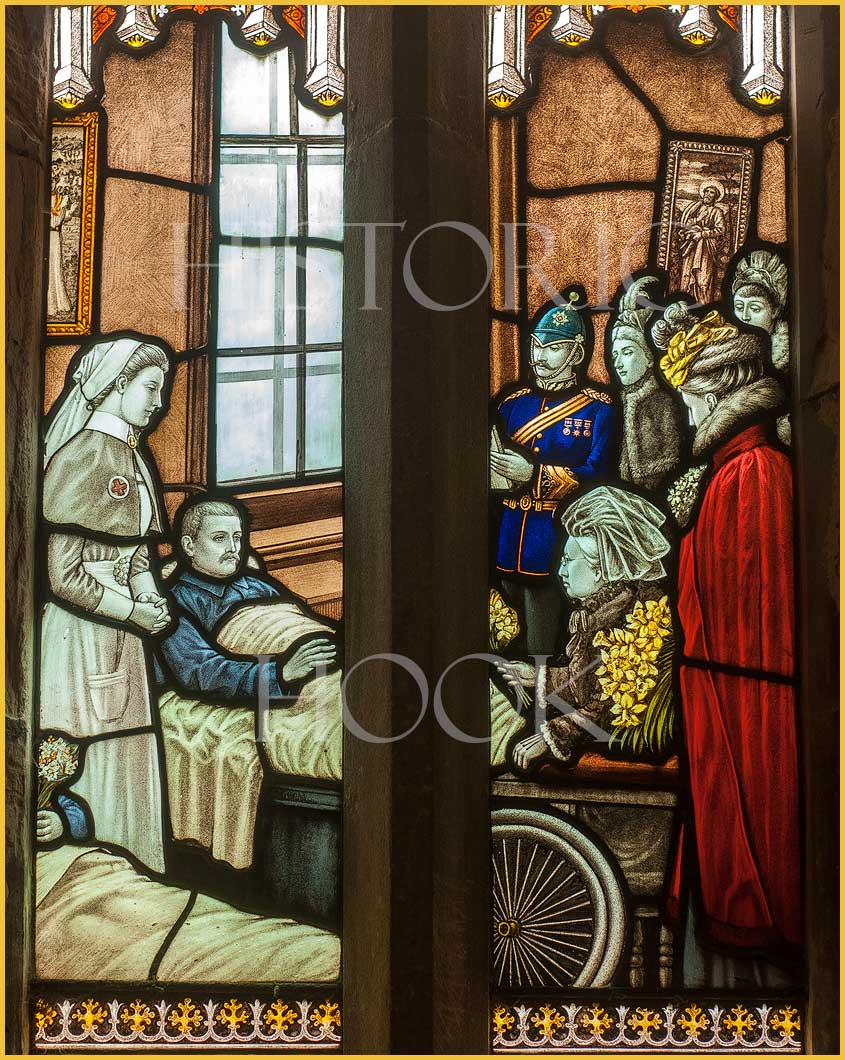

---------------------------------------------------------------------------------------
Date AD Historical Events Hook Life
-------------------------------------------------------------------------------------------------------------
43-409 Romans in Britain Locally powerful in York
-------------------------------------------------------------------------------------------------------------
409-1066 Anglo Saxon England Possible Hermit living in Huc
-------------------------------------------------------------------------------------------------------------
793-1066 Norse raids on northern Suggestions of Norse or Viking
England settlement at Hook
-------------------------------------------------------------------------------------------------------------
1066 Norman Conquest
-------------------------------------------------------------------------------------------------------------
1085 Doomsday book - Norman No mention of settlement at
Lords given parcels of land Huc - Huc probably given to
in northern England Lord de Huuc whose forebears
were Norman conquerors
-------------------------------------------------------------------------------------------------------------
1100-1135 Henry I Ankelinus de Huuc - Lord of
the Manor with Avise his wife
-------------------------------------------------------------------------------------------------------------
1189-1192 Richard I Did Roger de Huuc join 3rd
Crusade?
-------------------------------------------------------------------------------------------------------------
1199-1216 'Bad' King John Roger and Margaret de Huuc
- Lord and Lady of the Manor
-------------------------------------------------------------------------------------------------------------
1215 Magna Carta
-------------------------------------------------------------------------------------------------------------
1216-1272 Henry III
-------------------------------------------------------------------------------------------------------------
1224 John de Houk granted
permission for a Chantry
Chapel
-------------------------------------------------------------------------------------------------------------
1225 One of the de Huuc family
most likely buried in the
church
-------------------------------------------------------------------------------------------------------------
1250 Moat was added around the Manor House about this time
-------------------------------------------------------------------------------------------------------------
1272-1307 Edward I Willian and Alice de Houk
-------------------------------------------------------------------------------------------------------------
1304-1307 William High Sherrif of
Yorkshire
-------------------------------------------------------------------------------------------------------------
1307-1327 Edward II Thomas and Joan de Houk
-------------------------------------------------------------------------------------------------------------
1324-1327 Thomas de Houk ward to
Margaret Dispenser
-------------------------------------------------------------------------------------------------------------
1377-1399 Richard II Hook mentioned in Poll Tax
Documents of 1379
-------------------------------------------------------------------------------------------------------------
1399-1413 Henry IV Hall Garths leased to Thomas
Ughtred os St. Mary's Abbey
in York
-------------------------------------------------------------------------------------------------------------
1407 Inclesmore map is drawn
-------------------------------------------------------------------------------------------------------------
1455-1487 War of the Roses Were Hook people involved?
-------------------------------------------------------------------------------------------------------------
1492 Columbus' first voayge
to America
-------------------------------------------------------------------------------------------------------------
1499 Hook churchyard consecrated
for burials
-------------------------------------------------------------------------------------------------------------
1534 Henry VIII becomes English Roman Catholic
head of the English churches become Church of
church England including Hook
-------------------------------------------------------------------------------------------------------------
1542 Thomas Cranmer's Prayers now said in English
English Prayer Book in Hook. Previously said in
Latin
1611 King James' 'Authorised' This English Bible used at
Bible is published Hook from then onwards
-------------------------------------------------------------------------------------------------------------
1626-1635 Dutch River constructed.
Don now into Ouse at Goole
-------------------------------------------------------------------------------------------------------------
1642-1649 English Civi War
-------------------------------------------------------------------------------------------------------------
1665 Great Plague begins
-------------------------------------------------------------------------------------------------------------
1706 Sotheron, Jefferson and
Godfrey become joint Lord's
of the Manor of Hook
-------------------------------------------------------------------------------------------------------------
1721 Joshua Jefferson in his will
leaves Almhouses in Water
Lane. One room is to be used
to teach 12 poor Hook
children for free
-------------------------------------------------------------------------------------------------------------
1743 Hook Hall built by the
Sotherons
-------------------------------------------------------------------------------------------------------------
1768 Industrial Revolution The Act of Inclosure for Hook
drawn up. Becomes law in
1877
-------------------------------------------------------------------------------------------------------------
1771 Mechanisation of agriculture
begins to change the shape of
the village and its land use
-------------------------------------------------------------------------------------------------------------
1774 Frank Sotheron goes to sea
aged 9
-------------------------------------------------------------------------------------------------------------
1775-1783 American War of Members of both the
Independence Sotheron and Jefferson
families fought in different
battles
-------------------------------------------------------------------------------------------------------------
1797 Stockers of Hook establised
Pinfold under their bye-law
men
-------------------------------------------------------------------------------------------------------------
1804 Hook House built
-------------------------------------------------------------------------------------------------------------
1805 Battle of Trafalgar Frank Sotheron (later
Admiral Sotheron) serves
under Lord Nelson
-------------------------------------------------------------------------------------------------------------
1816 Hook's first Methodist Chapel
-------------------------------------------------------------------------------------------------------------
1825 First passenger steam Railways begin to take over
train from rivers and horse-drawn
coaches as the 'motorways of
the day', Hook does not get a
station
-------------------------------------------------------------------------------------------------------------
1832 Cholera epidemic in area
- 76 burials in Hook
-------------------------------------------------------------------------------------------------------------
1836 Hook's second Methodist
Chapel built
-------------------------------------------------------------------------------------------------------------
1844 Hook Church is restored
mainly paid for by Thomas
and Lucy Sotheron who also
pay for Hook National School
to be erected
-------------------------------------------------------------------------------------------------------------
1848 2nd Cholera epidemic in the area
- 121 burials in Hook
-------------------------------------------------------------------------------------------------------------
1869 Ouse rail bridge opened at
Hook
-------------------------------------------------------------------------------------------------------------
1874 Hook's third Methodist Chapel
built
-------------------------------------------------------------------------------------------------------------
1914-1918 First World War
-------------------------------------------------------------------------------------------------------------
1925 Memorial Hall opened
-------------------------------------------------------- -----------------------------------------------------
1917-1926 Great Depression Hook Shipyard - Calvert & Co. -
Shipyard closed
-------------------------------------------------------------------------------------------------------------
1930-1984 Cleveland Oil Terminal in Hook
-------------------------------------------------------------------------------------------------------------
1939-1945 Second World War 08/06/1944 Halifax Bomber
crashes at Hook
-------------------------------------------------------------------------------------------------------------
1976 New primary school built on
the old cricket ground
-------------------------------------------------------------------------------------------------------------
2000 Hook tapestry created
-------------------------------------------------------------------------------------------------------------
2007 Last piggery closes in Hook
-------------------------------------------------------------------------------------------------------------
